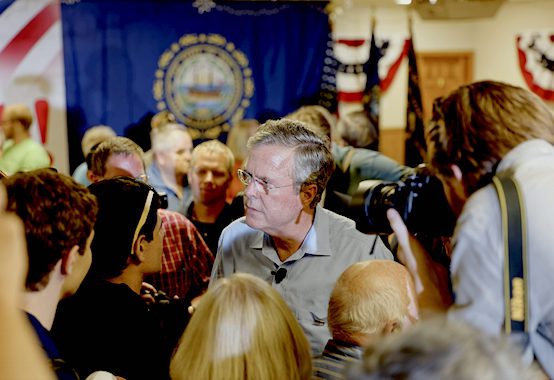Bush’s Syria Policy Is Still Foolish and Costly

Dov Zakheim praises Jeb Bush’s ideas for Syria:
His prescriptions for defeating ISIS include a ramped-up air campaign, more American troops on the ground and aid to the Kurdish fighters who have proved most effective in combatting ISIS in both Syria and Iraq. All told, his prescription was for true American leadership—in front, not behind—which would act as a magnet for other allies to join the fight against ISIS in a serious way. Most notably, the Arab states who have the most to fear from ISIS would be far more likely to contribute their own forces to the fight if they saw that America truly had “skin in the game.”
Bush’s speech last week at The Citadel was notable for including almost exactly the same content as an earlier foreign policy speech he delivered back in August. Despite the fact that Russia intervened directly in Syria in between Bush’s two speeches, this has had absolutely no effect on Bush’s thinking or his recommendations. Like other Syria hawks, he remains wedded to the idea of toppling Assad even though there is less international support outside the region for doing this than at any point in the last four years.
The belief that Arab states that have largely abandoned–or never joined–the fight against ISIS will start contributing more once the U.S. commits ground forces seems entirely unfounded. Daniel DePetris noticed this problem in his review of the speech:
How Jeb Bush would convince NATO and Arab partners to contribute more resources, money, and manpower towards the fight against ISIL is left out of the equation.
Not only are many of these Arab states preoccupied with their disastrous war in Yemen, but their priority in Syria has always been overthrowing Assad. As they have in Yemen, these states are much more concerned with fighting Iran and its allies (real or imagined) than they are in combating jihadist groups, and in some cases the Gulf states have helped to promote those very jihadists. If the U.S. does more in the war on ISIS, it is a given that almost all of our allies and clients will take that as license to do nothing more or even to do less than they are doing now. Once the U.S. is roped into bearing the bulk of the costs of a larger war effort, the other states in the region will be only too happy to sit back and watch us. An increased U.S. military commitment isn’t going to act as a “magnet” drawing other states deeper into the fight, but on the contrary will announce to these states that the U.S. has once again been lured into fighting other nations’ wars.
Elsewhere Zakheim approvingly mentions that Bush said that the U.S. isn’t going to be the world’s policeman, but it is telling that the hawks that say this never seem to see a conflict that the U.S. shouldn’t join. Interventionists disavow the role of “world’s policeman” when they are arguing for more intervention in order to make their immediate proposal seem less alarming, but the truth is that they are arguing for more intervention in this case because they assume that policing the conflicts of the world is a major part of America’s role in the world. If being the “world’s leader” amounts to much the same thing as being the “world’s policeman” in practice, it makes no difference if a hawkish politician rejects one name in favor of another. In fact, saying that the U.S. is the “world’s leader” could mean that the U.S. is expected to police the world’s conflicts and do a lot more besides that. It’s small consolation that Bush didn’t advocate “America’s involvement in every conflict around the globe” when he pushes for significantly increasing U.S. involvement in one of the world’s worst conflicts. Even if Bush doesn’t want to police every conflict in the world, he absolutely wants the U.S. to bear a much larger share of the costs of policing Syria for the foreseeable future, and that is already bad enough.
Comments